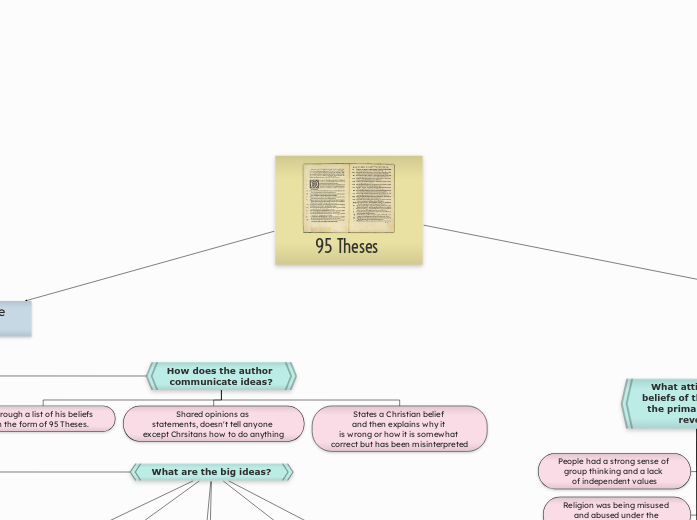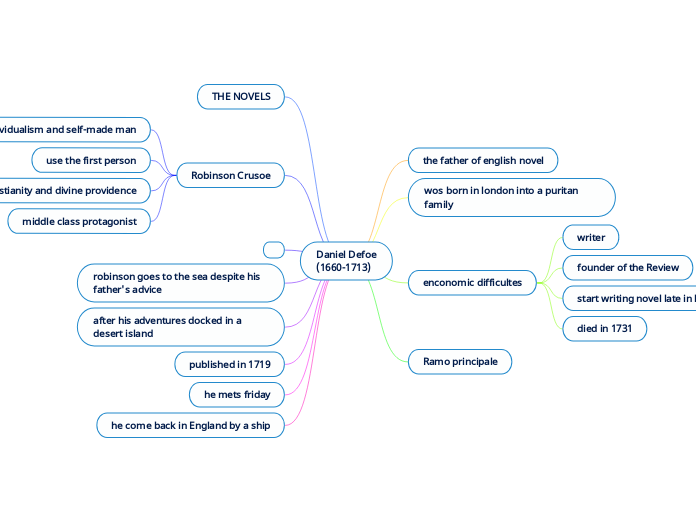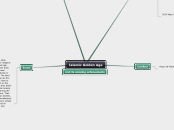95 Theses
Significance
Questions
What change did the
primary source cause?
Ultimately improved religious freedom
The empowerment of the lower class
led to action against other non
ethical aspects of their lives.
The bible was translated from Latin
to numerous other languages to
make it more accessible.
Led to the Protestant
Reformation in the 1500s
against the Christian Church
Led to the widely accepted
belief that Pope's were mis-teaching
the bible, leading to withdraw from
its practices.
Luther was put on trial to
defend his Theses, leading to
the court communicating him
from the Chruch.
Luther was almost burned at the
stake and was kidnapped by Fredrick the Wise who wanted to protect him.
A massive battle begun
between Catholics and
Lutherans, resulting in
hundreds of thousands deaths.
His ideas spread through Europe,
causing a nationwide outrage
and change in Christian teachings.
Increased individualism and the
awareness of the man controlling
his fate in and after life.
The religion Jesuits was
established by The Papal Bull.
The formation of Protestants
versus Catholics and Chrisitians
What attitudes or
beliefs of this era did
the primary source
reveal?
The concept of a moral conscience
was becoming increasingly important
People had only just started
challenging authority
Underscores the importance of
being a devoted to a religion
and chruch.
Religion was being misused
and abused under the
term "indulgence".
People had a strong sense of
group thinking and a lack
of independent values
The fear of God is
represented in the document
Highlights the value of
being forgiven by God
before death.
The afterlife was a reality
People would shape their lives
around seeking God's acceptance
Religion was an extremely
powerful institution
Primary Source
Questions
Whose perspectives are omitted/questioned/challenged?
Pope Julius II is
being criticized for
how the bible was shared
in churches.
Doesn't consider the obstacles
minorities faced at the time
The text was created to
challenge Christian beliefs,
therefore presenting them
in a negative way.
Whose perspective does it reflect?
A powerful, white,
and wealthy man
living in Wittenberg Germany
Written from the perspective
of someone who disagrees
with the Christian church and
does not practise it the way its taught.
Luther was more focused
on Christianity and changing religion
than handling geopolitical issues facing
his society
Luther was well-educated
and versed in Christian and
Catholic religions
Luther's philosophical beliefs
shaped each thesis
Based in the Roman
Catholic religion
and forming Lutheranism
What does it look like?
Written in Latin in a large,
black, and curvy font.
It is a book that is
yellow in colour
and appears aged.
A physical piece of paper
that looks similar to a scripture.
Luther nailed it to a
Church door where it
was initially discovered.
Who wrote it? Why?
Wrote it to reform and
argue against a number of
Christian practises and beliefs
To preach his own values and
create a new religion himself
Martin Luther
(1483-1546)
Taught at a University
in Wittenberg
Luther was a German priest
and theologian
Which questions can this source help me answer? Which can it not?
Provides zero context on
any time period before or
after the document, only Luther's
beliefs and Christian practices.
Cannot explain actions
taken by Luther previous to
the Theses book
Cannot answer speculations
on the connection between
95 Theses and the reformation
Can not answer questions
about the church response
Answers how Luther
felt towards religion
Cannot answer if
the document led to
any change in religion
What ideas are left out?
Different people that
shaped the bible and
Christian/Catholic religions
How humans came to be/
the origin story
Concepts of race, sex, and
orientation that are
present in the bible
How to remain devout while
different religions co-exist
Female identifies and the
role of family relationships
What are the big ideas?
Action needs to be taken
to change the Christian and Catholic
churches belief systems
Challenging authority in
an act of anger against
church practices
The concept of informing
Christians of what they do not
already understand about God
Not punishing someone
for sins that have been
forgiven (indulgence) is
not acceptable.
Believes in penance (self
-inflicted punishments
to repent a wrong doing)
Believes in repentance
(expressing regret for
wrong doings)
How does the author
communicate ideas?
States a Christian belief
and then explains why it
is wrong or how it is somewhat
correct but has been misinterpreted
Shared opinions as
statements, doesn't tell anyone
except Chrsitans how to do anything
Through a list of his beliefs
in the form of 95 Theses.









